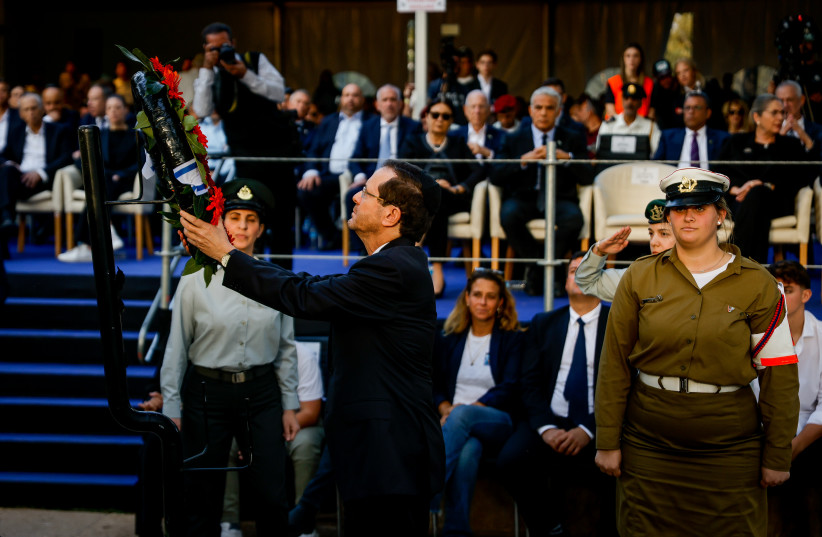A much larger turnout than in recent years filled the main hall of the President's Residence on Sunday for the traditional Ner Yitzhak ceremony that sets off a series of state ceremonies in memory of assassinated prime minister Yitzhak Rabin.
This year marks the 27th anniversary of his death and the centenary year of his birth.
Ner Yitzhak, which is an oversized memorial candle, is lit by the president of the state accompanied by Rabin's grandchildren or great-grandchildren and various youth.
This year, in a departure from the norm, none of the members of the Rabin family were among the speakers, although many of them were present. In the past, members of the family took turns in speaking, with a different member each year.
This year, aside from Herzog, speakers included radio and television personalities Arieh Golan and Lucy Aharish; and Rabbi Re'em HaCohen, the head of the Otniel Yeshiva and the rabbi of the settlement of Otniel located on the West Bank south of Hebron.

The underlying message: Violence, hatred, incitement detrimental to democracy
The underlying message in all the speeches was that violence, hatred and incitement are detrimental to democracy. HaCohen reminded the audience that the Second Temple was destroyed because of baseless hatred, and declared that the third Temple could not be built by force, but by the spirit of goodwill and mutual respect. "Violence begats violence," he said.
Herzog made the point that very little has changed over the past 27 years, as there are increasingly worrying signs of incitement, violence and hatred which undermine the foundations of democracy. These incidents illustrate the difficulty that Israeli society has in its ability to conduct disputes in a civilized fashion, and to navigate the future of the state together, when there is not consensus, over the most vital issues, said Herzog.
Yet another round of elections is behind us, he commented, and still the air and social media platforms are full of accusations of guilt and betrayal, and comparisons to Nazis.
Warning that some of these charges are dangerously violent, Herzog urged the leaders from the full spectrum of Israeli society to say enough is enough and to ask their followers to act responsibly.
This is not the first or even the second time that he has done this, but it seems that his pleading falls on deaf ears.
Herzog emphasized that no one is going anywhere. In general, the nation is staying put, and therefore there is no room for racism, violence or hatred.
"The State of Israel is obligated to act in the spirit of the proclamation of independence," he insisted.
Turning to the large representation of youth who took up half of the hall, Herzog told them of the importance that their influence could have on those around them, on their communities, and on the state as a whole.
Learn to know the opinions, lifestyles and beliefs of the other, and listen to each other, he advised them. It was permissible to argue he said, but not to act violently and to negate what the other says. Even if he thinks differently, and belongs to a different political camp, learn to recognize and appreciate the mosaic of ideas.
"Rabin's death changed the face of Israel."
Arieh Golan
"Rabin's death changed the face of Israel," said Golan, adding that it killed all hope of implementation of the Oslo Accords.
Even though there were those who called Rabin a traitor and a murderer, charged him with having sold out the country, and threatened pulsa de nura, and other life-threatening curses, "we could not believe that we would be broadcasting that he was assassinated," said Golan, who admitted that he had thought that it might happen to Shimon Peres, who was the architect of the Oslo Accords but never to Rabin.
After the assassination he recalled, he had asked noted author Amos Oz why young people were sitting on the ground, lighting memorial candles, and weeping.
"They are weeping because they know that Rabin stood between them and the next war," Oz had replied.
Golan assessed that Rabin had attempted to change the destiny of Israel and prevent another war. "I'm not sure that he would have succeeded," said Golan.
Focusing on democracy even more than all the other speakers, Aharish said that violence is the enemy of democracy, and listed many areas of violence that are prevalent in Israel - among them violence in the Arab sector; violence against women; violence on the roads; and violence against soldiers who are on hand to protect the nation. All these are stains on democracy, she said.
